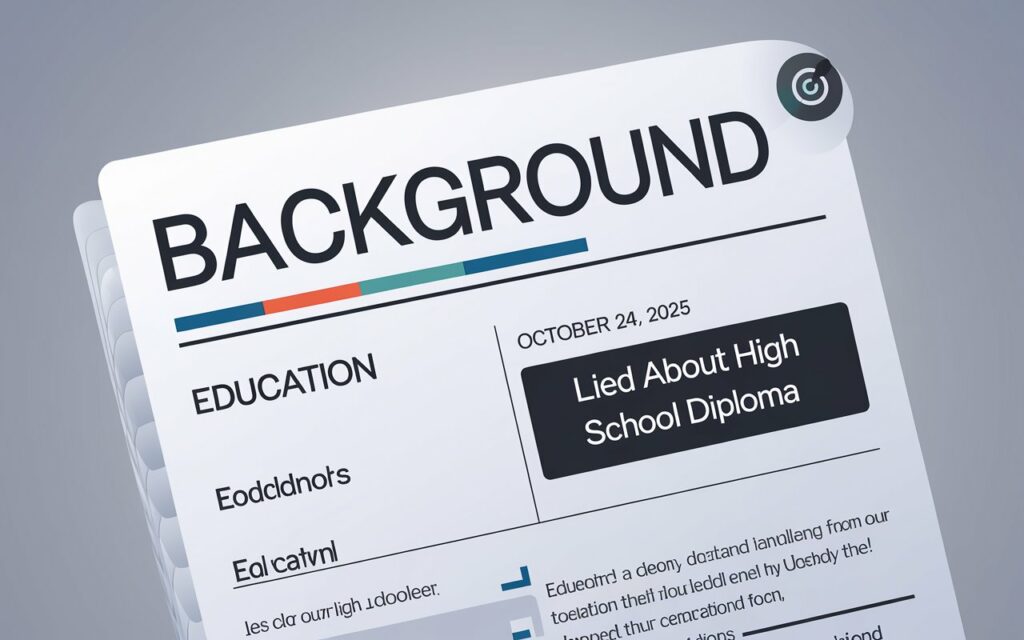Lied About High School Diploma Background Check in 2025? Here’s What You Need to Know Before It’s Too Late
Table of Contents
In today’s job market, employers are more vigilant than ever about verifying candidate credentials—including high school diplomas. In 2025, advanced background check technologies make it easier to detect inaccuracies or false claims. If you’ve ever considered lying about your high school diploma, or already have, it’s important to understand the potential consequences, how background checks work, and what to do if you’re caught.
This article breaks down what happens when someone lies about having a high school diploma, how employers verify that information, and what options exist for those who lack formal education.
Why Lying About a High School Diploma Can Backfire
Falsifying education means providing inaccurate or untrue information about your academic background.
Features & Risks:
- Employment Termination: If a lie is discovered before or after hiring, job offers can be rescinded, or current employment may be terminated.
- Blacklist Consequences: Companies may share your information internally or across industries, making future employment more difficult.
- Reputation Damage: In tight-knit professional fields, your credibility may be permanently damaged.
- Legal Implications: If the lie leads to securing a position under false pretenses, it can constitute fraud, especially in regulated industries.
2025 Insight: In today’s hiring environment, authenticity is more valuable than ever. Employers are open to candidates with diverse or unconventional educational paths—as long as they’re honest about it.
How Employers Verify High School Diplomas During Background Checks
Educational verification is the process of confirming a candidate’s academic history with the issuing institutions.
Methods Used:
- Third-party verification services: Companies like National Student Clearinghouse, Checkr, and HireRight contact schools or pull directly from education records.
- Digital Records Databases: In 2025, many schools store diplomas in blockchain-secured, tamper-proof databases, which employers can instantly access.
- Automated Portals: Applicant Tracking Systems (ATS) now have built-in plugins to verify academic records automatically.
Information Checked:
- School name and location
- Dates of attendance
- Graduation date
- Type of diploma or degree earned
Feature of 2025 Systems: Real-time verifications and notification alerts if discrepancies are found in education claims.
What Happens If You’re Caught Lying About Your Diploma?

Falsifying your high school diploma on a job application or during a background check is a serious offense that can have wide-ranging consequences, both immediate and long-term. Employers today have access to sophisticated verification tools, making it easier to detect inaccuracies. Here’s what can happen if you’re caught lying about your diploma:
Job Offer Withdrawal
When an employer discovers a discrepancy in your educational claims during or after the hiring process, the most immediate consequence is the withdrawal of any job offers made to you. Employers invest time and resources in recruitment, and dishonesty breaks the trust necessary to proceed.
Why this happens:
- Employers expect transparency and honesty. A false claim calls your integrity into question.
Impact on you:
- You lose the opportunity to join the company, often without recourse.
- 2025 context: With digital verification becoming standard, employers receive instant alerts on false claims, making late discoveries more common than before.
Employment Termination
If you have already been hired and the lie is uncovered, termination of your employment is the most likely outcome. Many employment contracts include clauses that allow dismissal for falsification of credentials.
Reasoning:
- Trust is foundational in the employer-employee relationship. Dishonesty undermines workplace trust and may lead employers to question your entire work ethic and character.
Legal angle:
- In many jurisdictions, falsifying information can be grounds for dismissal “for cause,” meaning you may not be entitled to severance or unemployment benefits.
- Example: Imagine working for a company for months or years, only to be let go immediately when your false diploma claim is discovered — damaging your professional reputation.
Loss of Professional Licenses or Certifications
Certain professions, especially in regulated industries like healthcare, finance, education, and law enforcement, require verifiable qualifications as part of their licensing or certification process.
Why it matters:
- Professional licensing boards demand truthfulness as a prerequisite for holding a license.
Consequences:
Discovery of a fake diploma claim can lead to:
- Suspension or revocation of your professional license.
- Notification of regulatory authorities, which may impose fines or ban you from practicing.
- Increased difficulty in obtaining licenses in the future.
- Example: A nurse who falsifies their diploma may lose their nursing license and be barred from practicing healthcare altogether.
Can You Still Get Hired Without a High School Diploma?
Yes—especially in 2025. Many companies now value skills-based hiring over traditional credentials.
In-Demand Alternatives:
- Certifications: Programs like Google Career Certificates, AWS Cloud Practitioner, or Microsoft’s Career Essentials can substitute for formal education.
- Work Experience: Proven ability and references matter more than a diploma in fields like retail, logistics, or tech support.
- Apprenticeships: Paid, hands-on programs in trades like plumbing, electrical, or culinary arts are widely accessible.
- Soft Skills: Employers now measure teamwork, reliability, and adaptability during interviews or soft skill assessments.
Feature of 2025 Job Market: Online training platforms like Coursera, Skillshare, and edX offer micro-credentials recognized by major employers.
How to Correct a False Statement on Your Application

Falsifying information on a job application, especially about your high school diploma, can put your job prospects at risk. However, if you realize you made a mistake or intentionally lied, taking immediate and honest corrective action can sometimes salvage your reputation and future opportunities. Here’s how to navigate this tricky situation effectively:
1. Act Quickly: Don’t Wait for the Background Check to Start
The moment you realize that your application contains false information, reach out to the employer’s Human Resources (HR) department without delay. Waiting for the employer to discover the discrepancy during a background check can make the situation worse.
- Why act fast? Proactive honesty shows responsibility and maturity. It can also prevent the employer from feeling misled or tricked.
- How to do it: Send a polite, clear email or make a phone call to the HR representative or hiring manager. Express your desire to clarify and correct the information before the background screening begins.
- Benefit: Early disclosure can foster goodwill and demonstrate that you are trustworthy, even if you initially made a mistake.
2. Take Responsibility: Be Honest and Transparent
When correcting your application, own up to the error without making excuses or shifting blame.
- Why responsibility matters: Employers respect candidates who demonstrate integrity by admitting faults openly. It reflects positively on your character and professionalism.
- How to phrase it: Acknowledge the falsehood clearly (“I mistakenly listed that I had a high school diploma when I do not”) and explain that you understand the seriousness of providing accurate information.
- Impact: This honesty can help rebuild trust and may keep you in consideration for the role or other positions within the company.
3. Offer Proof of Effort: Demonstrate Your Commitment to Improvement
If you’re working to improve your educational qualifications, share any concrete evidence or plans that show you are taking steps to correct the issue.
- Examples include:
- Enrolling in GED preparation classes or online courses.
- Obtaining vocational or technical certifications relevant to the job.
- Participating in workforce training or apprenticeship programs.
- Why this matters: It highlights your commitment to personal and professional growth, showing that you’re proactive despite past missteps.
- Effect: Employers may appreciate your dedication and consider you for roles that align with your current qualifications or your ongoing development.
4. Update Public Profiles and Resume to Reflect Accurate Information

Beyond the job application, ensure that all your public-facing professional profiles (like LinkedIn) and your resume are corrected to include only truthful, verifiable details.
- Why this is important: Employers often cross-check your application with online profiles and professional networks.
- Risks of inconsistency: If your LinkedIn profile claims a diploma you don’t have, it will look suspicious and hurt your credibility.
- What to do: Remove or revise any misleading information immediately to avoid further red flags.
Building a Career Without a Traditional Education
Pathways to Professional Success Without a Diploma:
- Earn a GED: In 2025, many states offer free online prep and testing programs for GED or equivalent credentials.
- Certifications: Free and low-cost options are available in cybersecurity, digital marketing, data entry, and customer service.
- Online Learning Platforms: Websites like Udemy, Coursera, and FutureLearn let you earn verifiable certificates from respected universities.
- Workforce Development Programs: Offered by community colleges, nonprofits, and government job training agencies.
Feature Highlight: Employers now receive candidate “skill reports” that measure competencies in real-time assessments, often making diplomas secondary to proof of skill.
FAQs about Lied About High School Diploma Background Check
Q1: Can lying about a high school diploma lead to legal trouble?
Yes, especially in regulated fields. Falsifying credentials can be considered fraud and may involve legal penalties.
Q2: What if I’m caught lying after I’ve been working for a while?
You risk immediate termination and damage to your professional reputation, which can affect future employment.
Q3: Are there legitimate ways to get a high school equivalency diploma?
Yes, you can earn a GED or equivalent through state-approved programs, many of which are free or low-cost.
Q4: Do employers still require high school diplomas in 2025?
Many don’t, especially for entry-level positions. Skills, certifications, and experience are often prioritized.
Q5: How can I prove my skills if I don’t have a diploma?
You can obtain industry-recognized certifications, complete apprenticeships, or showcase portfolios of your work.
Conclusion
Lying about your high school diploma in today’s job market is risky and can backfire with serious consequences. However, transparency, accountability, and a commitment to improving your skills can help you overcome setbacks. In 2025, employers increasingly recognize diverse educational paths and value honesty and demonstrated ability over formal credentials alone.
If you’ve made a false claim, act quickly to correct it. Pursue alternative certifications and training to build a strong career foundation. Remember, integrity and continuous learning are the true keys to long-term professional success.
Do Follow Dragcast on Social Media For More Such Content.












Add Comment